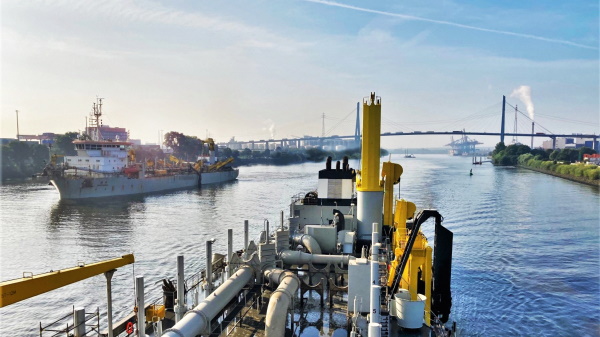

For the first time in Germany, the dredging company Jan De Nul Group from Luxembourg is using solely second-generation biofuel for maintenance dredging works in the Port of Hamburg. This fuel contains no petroleum, but processed vegetable waste oil as a raw material, entirely in line with the principles of a sustainable circular economy.
Jan De Nul Nassbaggerei und Wasserbau GmbH has been awarded an important contract for maintenance dredging works in the Port of Hamburg within the scope of a European award procedure. Two suction hopper dredgers, Kaishuu and Alexander von Humboldt, will execute these dredging works between June and December 2021, thus ensuring accessibility to numerous important terminals in the Port of Hamburg.
Thanks to the use of biofuel during these works, emissions of particulate matter and sulphur compounds are also significantly reduced, as combustion is much more efficient than with conventional diesel fuel.
“We have already used this sustainable biofuel for several of our vessels in the Benelux and the UK”, explains Michel Deruyck, Head of the Energy Cell at Jan De Nul Group. “Decarbonisation is at the top of Jan De Nul’s agenda and is supported throughout the company, both commercially, operationally and technically. We always strive to go beyond what is imposed on us. We’re going for zero.”
A significant contribution to climate protection
Dredging works are indispensable to ensure the accessibility of the Port of Hamburg and its terminals. This is the only way to ensure that goods can be transported far into the hinterland by sea-going vessels, which are particularly environmentally friendly compared to other modes of transport. Many hundreds of kilometres that do not have to be travelled by truck or train are a significant contribution to climate protection.
Worldwide, maintenance dredging works are among the most important tasks of large seaports. The fact that this important task can now be executed in a more sustainable manner is a milestone as the measures taken will save around 45,000 tonnes of CO2 this year.
There is currently no contractual obligation to use climate-neutral fuels because they are not yet available in North German seaports. The vessels therefore regularly travel to Eemshaven in the Netherlands to pick up the fuel.
Source: Jan De Nul
